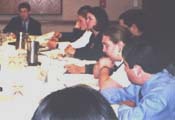
[ Home ]
About PMC
Click here for more information about the conference
Click here if you are an advisor and are interested in attending the conference
Click here if you are a delegate
Click here if you are a Princeton student interested in PMC
Princeton Model Congress is a subsidiary of the American Whig-Cliosophic Society run by a group of Princeton University students who organize and operate a government simulation program in Washington, D.C. for high school students. This year's conference will be held November 112-19, 2006 at the Hyatt Regency Capitol Hill, in downtown Washington, D.C.
Our Purpose
| The purpose of PMC is to educate students in the workings of our government and to encourage their active involvement in the democratic process. To this end, we have developed a structure in which students from across the country can gather in the nation’s capital to discuss the pressing issues of the day. Serving as delegates to our conference, students compose bills according to their interests, and Princeton students chair committees and full House and Senate sessions in which the students debate their legislation. We strive to make the conference as realistic and educational as possible, with a presidential election, cabinet appointments, Supreme Court deliberations, a vigilant Press Corps, unexpected crises, and speeches to the delegates by today's national and international leaders. |  Committee session at PMC 1998. Students work in small groups to discuss ways to improve current national problems. |
Our Structure
Four distinct congresses and a number of Special Programs comprise Princeton Model Congress. The Red, White, Blue, and Orange Congresses each have a Senate and a House of Representatives, with six Senate committees and seven House committees in each Congress. Students are not required to take on the roles of current representatives or to represent state interests, but instead select and debate bill topics pertinent to their committee and of individual interest. Bills that pass committee are then brought before Full Sessions, where the Congressional Senate or House of Representatives convene. Bills passed in Full Session are sent to the Princeton Model Congress President to be signed or vetoed.
 Students also have the opportunity to present ideas to larger groups. |
Princeton Model Congress delegates elect a President at Opening Ceremonies. The President is a member of the Model Presidential Cabinet, one of our Special Programs. Individual students must apply to Special Programs, as space is limited. Besides the Model Presidential Cabinet, PMC also has a Model Supreme Court, and Press Corps. Delegates to these programs interact with the Congresses, debate topics relevant to their work and participate in special crises. |
Our History
Celebrating its 24th birthday this year, PMC is one of the oldest model congress programs in existence today. The program began in 1982 with a small conference in New York City, organized by a group of Princeton undergraduates from the American Whig-Cliosophic Society, the world’s oldest college literary, political, and debate society. Founded in 1765 by James Madison (Woodrow Wilson and Bill Bradley are just a few of its distinguished alumni), the Society has maintained its mission of sponsoring educational programs and encouraging political participation in students to the present day.
It has been under the aegis of Whig-Clio that PMC has grown in leaps and bounds, bringing as many as 1200 students annually to Washington, D.C. for the Conference. At the same time, however, PMC has been careful to preserve the same personal touch and dedication to the individual student we have cherished since our founding. To this end, PMC maintains a small delegate-to-staff ratio (in 2001, 7:1) to ensure that each student is given personal attention and the best possible learning environment.
To this day, PMC has provided almost 10,000 high school students with the opportunity to work with Princeton University students.